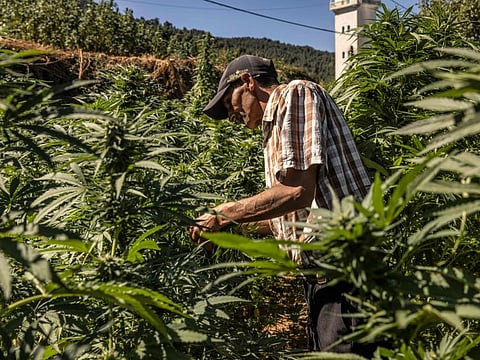Morocco issues first permits for cannabis production
Law is intended to improve farmers’ incomes and protect them from drug traffickers

RABAT: A Moroccan state agency has issued the first 10 permits for the use of cannabis in industry and medicine and for export, it said, the result of a law passed last year.
Farmers who organise into cooperatives in the northern mountain areas of Al Houceima, Taounat and Chefchaouen will be gradually allowed to grow cannabis to meet the needs of the legal market, the agency said.
Cannabis is already widely cultivated in Morocco illegally and the new law, passed by the parliament last year, does not permit its use for recreation.
The law is intended to improve farmers’ incomes and protect them from drug traffickers who control the cannabis trade and export it illegally to Europe.
Growers now hope that the law will help them profit legally from medicinal cannabis, increasingly used to treat conditions including multiple sclerosis and epilepsy.
Morocco lies on Europe’s doorstep and is potentially well placed to become a top legitimate exporter.
Moroccan farmers’ income from cannabis fell from 500 million euros (now around $497 million) a year in the early 2000s to less than 325 million euros in 2020, according to an interior ministry study last year.
“The market has fallen drastically,” said Karim, another grower.
Adding to the pressure, he was only able to farm part of his family’s land in Azila this year because of water shortages driven by the worst drought in decades.
Moroccan authorities have also stepped up raids against farmers in the Rif as they seek to dismantle smuggling networks in favour of the legal trade.
A six-hour drive away in the capital Rabat, a government official insisted that better times were around the corner for cannabis growers.
“There may be concerns, but legalisation will dispel them because it will benefit the growers,” he said, asking not to be identified because he was not authorised to speak to the media on the subject.
The state estimates that growers could receive some 12 per cent of revenues from regulated cannabis production, compared to just four percent on the black market, according to state news agency MAP.
Cannabis farms covered 55,000 hectares (around 136,000 acres) in the northeast of the kingdom in 2019, providing livelihoods for up to 120,000 families, according to a study prior to the law being passed.
Civil society groups in the area are now mobilising to inform farmers about the technical aspects of the new system.
Some details are “complicated”, said Soufiane Zahlaf, who represents Azila residents in dealings with authorities on the matter.
“But if the approach of the authorities is inclusive,” he said, “then great things can be achieved.”



